African churches are supporting teachers, parents and children in many ways, including creating new programs to facilitate distance learning.
UM News communicators from around the continent share how schools and churches are adapting.
Jump to story: Kenya | South Africa | Zimbabwe | Sierra Leone |
Liberia | Mozambique | Congo
Church promotes mobile learning app in Kenya
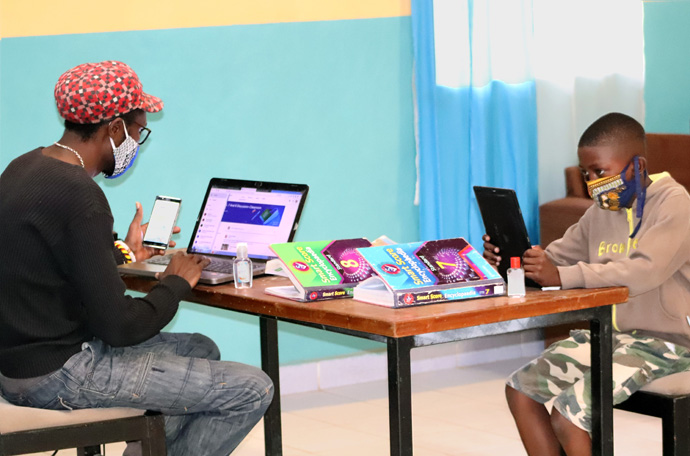
Youth members at the church developed a mobile application platform called Darasani, the Swahili word for “in the classroom.”
The service provides an online environment for learning and collaboration among students and teachers. The app is available free through the Google Play Store with approved primary and secondary school curriculum.
Boneface Ndira, IT team leader for Darasani, said the platform lets students access content on their mobile phones.
“We need to go out of our ways to make sure that learning continues even under the current COVID-19 situation. The educational app contains support materials informed by research for all levels of education below the university (level).”
The government’s Education Ministry announced in July that primary and secondary school students won’t return in-person until January. Exams also have been canceled.
Winnie Nangila, an eighth-grade teacher at Dr. B.T. Cooper United Methodist School —operated by St. John United Methodist Church — said the Darasani program changed the way she teaches.
“It enables me to reach out to my students more efficiently and effectively through chat groups, video meetings and also document sharing during this pandemic. My students also find it is easier to communicate,” she said.
She plans to keep using it even after coronavirus. “I believe traditional offline learning and e-learning can go hand in hand.”
Challenges such as network infrastructure, data prices and access to adequate digital equipment must be addressed for the app to be used nationwide, Nangila said.
Nicolas Nyabaya, a teacher at Dr. B.T. Cooper United Methodist School, said children in the slums are disadvantaged because their parents don’t have smartphones, laptops and money to buy internet bundles.
Other challenges include training for educators, inadequate funding and parents who aren’t equipped to oversee e-learning.
The Rev. Patrick Wandera, teacher and senior pastor at St. John United Methodist Church, said the health crisis has highlighted the ability to pool skills and resources of different players in the public and private sectors, both nationally and internationally.
Reuben Replie Ososo, head teacher at Dr. B.T. Cooper, said the app has eased some stress, but added that the school — which has been supporting refugee students for more than a decade — faces other challenges. It received an eviction notice after getting behind in rent because of the pandemic.
“The eviction has come at this most difficult of times. It’s unfortunate to have more than 200 Congolese students on refugee status with nowhere to study when schools reopens,” he said.
Despite the struggles, the Rev. Wilton T. Odongo, secretary to the Kenya-Ethiopia Conference and Nairobi District superintendent, said he is encouraged by how the church is helping with distance learning across the country.
“Never before have we witnessed educational disruption on such a scale,” Odongo said, adding that the church must make sure rural students don’t fall behind.
“Let’s work together to find a way to make sure that children everywhere can continue their education, with special care for the most vulnerable and disadvantaged communities,” he said.
Jump to story: Kenya | South Africa | Zimbabwe | Sierra Leone |
Liberia | Mozambique | Congo
Students to return in COVID-19 hot spot
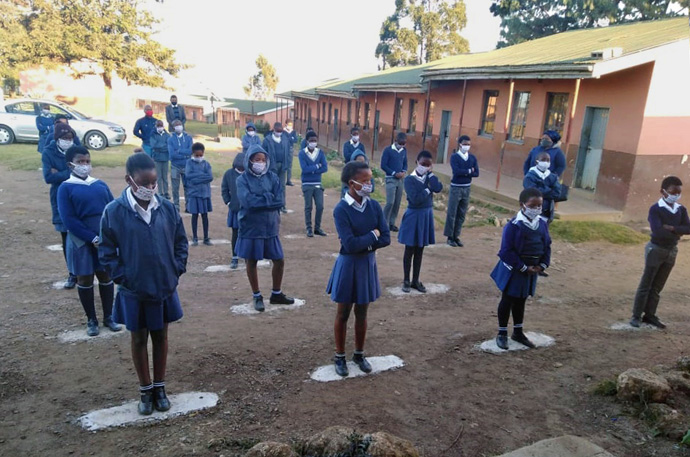
“We are facing unprecedented and challenging times as a country and the world at large during this coronavirus pandemic,” said the Rev. David Mucherera, director of the episcopal committee and a pastor at Tshwane United Methodist Church in Pretoria.
He encourages church members and the community to follow health guidelines.
“People must wear their masks at all times and follow all the precautions. Children should stop sharing lunchboxes during lunch breaks because that increases the chances of infecting another person when one is already sick,” Mucherera said.
Thousands of children returned to school in June, only to have at least 968 schools close due to outbreaks. More than 2,400 teachers and 3,000 students were infected, according to a South African Broadcasting Corporation report. On July 24, President Cyril Ramaphosa ordered schools to close again until Aug. 24, with some exceptions.
Parents and teachers are terrified of returning to in-person school because of the virus, said Sabelo Nofenele, a young adult member of Cape Town Circuit United Methodist Church and teacher at Cape Town High School.
There have been more than 596,000 confirmed cases of COVID-19 in South Africa and more than 12,400 deaths, according to Johns Hopkins University data.
“We are indeed worried for our lives as teachers that we might get infected with this virus and infect many other souls. But at the same time, it is important that we learn how to live and work in this environment, because scientists argue that this virus could be around for a long time,” Nofenele said.
He added he is grateful for his church’s pastors checking on him and his fellow teachers and for encouraging messages they send every day via social media.
Ongama Ntlakaza, a 45-year-old father of four children, said he is terrified of the virus, especially now that his younger children are returning to school.
“We are not even sure if they will be able to wear their face masks for the whole day,” he said. “We don’t know the right decision to take as parents. Some of us are confused because the government said it is your choice to take or not to take your child to school, but if you don’t take them … they will be left behind.”
If children stay home, parents are responsible for home schooling.
“This home schooling requires a lot of energy and data from both parents and children and you must have a smartphone or a laptop in your house for your kids to be active,” Ntlakaza said. “Some parents are not working because they lost their jobs during this time of COVID-19 and South Africa’s lockdown. Some parents and or guardians are not educated and/or are not familiar with the systems to help their children to do their work at home.”
Mihlali Ntshentshe, a 10-year-old student at Port Edward Primary School, said he was excited to see his teacher and friends.
“The only thing that bothers us is that we are not allowed to play with our friends and there are no afterschool extra-curriculum,” Ntshentshe said.
He said each grade has allocated times for breaks and lunch and there is always a teacher ensuring that students are practicing social distancing. Children’s temperatures are taken as they enter the building, and there are fewer students per class, with desks separated by screens.
Jump to story: Kenya | South Africa | Zimbabwe | Sierra Leone |
Liberia | Mozambique | Congo
Church school in Zimbabwe rolls out e-learning
With Zimbabwean schools still closed, many are turning to e-learning. One United Methodist school is at the forefront.
Murewa High School has successfully run trials for an e-learning portal expected to spread to other United Methodist schools, as well as public schools.
The school management system, Sybyl, integrates all school activities in one place, from providing virtual classrooms to administration functions and accounting.
“The Murewa High School pilot project is an eye-opener that we can do great things even under harsh conditions,” said the Rev. Solomon Mawoyo, education secretary for the Zimbabwe West Conference.
Students who participated in a trial celebrated the development.
“It is really a good place to continue with our studies during lockdown,” said Michael Muramba, a science student.
Arts student Tinotenda Chihombori agreed the program is beneficial.
Doug Mamvura, chief digital evangelist for Disruptive Technologies, is confident the educational platform will bring the classroom to the doorsteps of students. He said he was ecstatic about the success of the trial run.
“This pilot project far exceeded our expectations. ... We look forward to seeing more United Methodist schools coming on board.”
Mawoyo said lockdown restrictions and limits from the Education Ministry on parents paying fees for students have stalled efforts to add more schools.
“Once children are allowed to pay their fees, definitely more schools are coming on board,” he said.
Sydney Mapisaunga, headmaster of Murewa High School, said e-learning is a necessity amid lockdowns, but added that lack of internet connectivity is a challenge.
“E-learning … remains a dream for the majority of our students who come from rural or poor backgrounds. Those from urban or elite families will surely benefit, (but) the cost of data and smartphones are beyond the reach of many,” he said.
Mapisaunga remains concerned about the program’s cost, which is $2 (U.S.) per month, per student. He said that could be reduced as more schools and students come on board.
Murewa High School has 1,240 students. The Zimbabwe Episcopal Area has 14 primary schools, 12 secondary schools and 12 high schools. The church in Zimbabwe also oversees Maun Senior Secondary School in Maun, Botswana. That school reopened June 2.
“We have started with form five students. Each class is to have a maximum of 30 students. Within the class, students are required to maintain a one-meter distance per desk. All are required to wear face masks and (conduct) sanitation after every hour,” said the Rev. Tafadzwa Mabambe, who is serving as chaplain and pastor-in-charge at the school.
The school has more than 2,000 upper secondary students.
At Africa University in Mutare, fall semester classes will be conducted online with more than 870 freshmen beginning their academic life via the internet.
Jump to story: Kenya | South Africa | Zimbabwe | Sierra Leone |
Liberia | Mozambique | Congo
Some students return to school in Sierra Leone
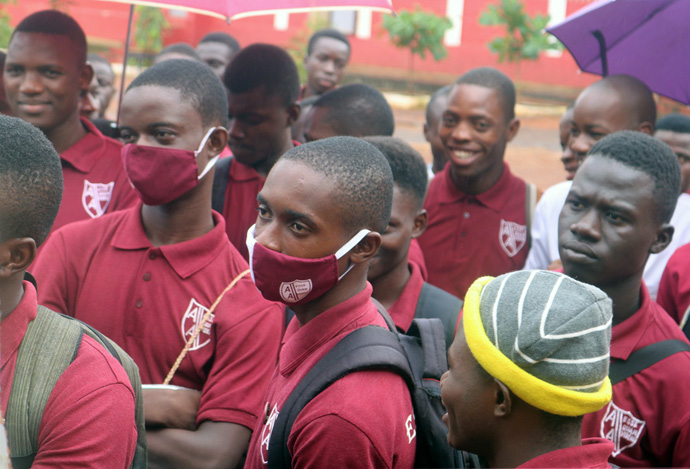
Students who are preparing for exit exams from primary, junior high and senior high schools have been allowed to return. Exams were suspended in late March after the first case of coronavirus was confirmed in Sierra Leone.
The remaining schools will reopen in phases beginning in September and October.
Despite challenges the first week — including issues with sanitizing the schools — teachers and students are adapting, said Junisa Vandy, principal of United Methodist Albert Academy, the only all-boys school in Freetown.
Up to 107 pupils at the school will be taking senior exams in August, Vandy said.
He said the government’s education ministry supplied handwashing materials to help get students safely back in school.
“We have divided the big classes into two. Normally, there are between 60 and 65 per class. Now, we have between 30 and 35, properly spaced out. We are observing social distancing,” he said.
He said that every student has a face mask and wash stations have been set up in strategic positions to encourage frequent hand-washing.
At the United Methodist University Preparatory Program, where the university is preparing students for external school exams, attendance dropped by 40% when schools reopened. Catherine Harding, the campus coordinator, noted that some children are likely staying home to study because of COVID-19 concerns.
At the start of the lockdown, the government of Sierra Leone re-introduced a radio-teaching program for at-home learning.
The program started in 2014 when schools were closed due to Ebola. It focuses on core subjects for students in primary and senior secondary schools.
In May, the United Methodist Child Rescue Center, a child care center for disadvantaged children, handed out solar-powered radio sets to 183 children who live in foster homes, with funds from Helping Children Worldwide. The American-based nonprofit supports health and education projects in Africa, including United Methodist Mercy Hospital and the rescue center in Bo.
“Government has done well by paying teachers to provide radio teaching programs throughout the country so that your time is not wasted while you wait for the coronavirus pandemic to end,” said Olivia Fonnie, rescue center director.
Jump to story: Kenya | South Africa | Zimbabwe | Sierra Leone |
Liberia | Mozambique | Congo
Liberia university struggles to adapt
Dr. Albert B. Coleman, president of United Methodist University of Liberia, said the university lacks the capacity to provide e-learning opportunities to its students, but staff are working on setting up digital platforms.
“This pandemic unveiled several weaknesses of the institution in meeting the educational demand of the Liberian people in time of crisis,” Coleman said.
The university closed March 25.
“We depend on tuitions to operate the university,” he said, adding that the university does not have an endowment to help operate in the absence of academic activities on the four campuses.
“Every effort that we are making toward reopening of the school is also intended to raise the needed funds for operation, besides providing the academic services,” Coleman said.
The Rev. Jerry P. Kulah, dean of the Bishop Innis Graduate School of Theology, said that as a college of the United Methodist University, the graduate school also closed.
While students have been away, he said they have been involved in anti-COVID-19 awareness and the distribution of food relief in their communities.
The graduate school was able to secure about $10,000 from a friend of the school overseas for a one-time food package to help staff members, pastors in rural communities and other needy individuals, Kulah said.
“COVID-19 also exposed us (to) the virus of hunger,” Kulah said.
The Rev. James Z. Labala, dean of the Gbarnga School of Theology, said when the school reopens, agriculture will be included as a subject, “to ensure that we prepare them for any eventual food insecurity. Our biggest challenge as a people during this pandemic is food insecurity.”
The school, located in central Liberia, also is a college of the United Methodist University of Liberia, offering undergraduate degrees in theology.
“Like the entire university, we all were not prepared for the conditions this pandemic exposed us to. Though we are in a closed community, we could not even operate the school through e-learning,” Labala said.
The University of Liberia is expected to reopen in September, according to initial discussion with the government, but no date has been set.
Currently, only senior students at the high school level, including at United Methodist schools, have returned to school to prepare for a regional public test. Primary school students will stay home until further notice from the government.
Jump to story: Kenya | South Africa | Zimbabwe | Sierra Leone |
Liberia | Mozambique | Congo
Schools in Mozambique stay connected with students
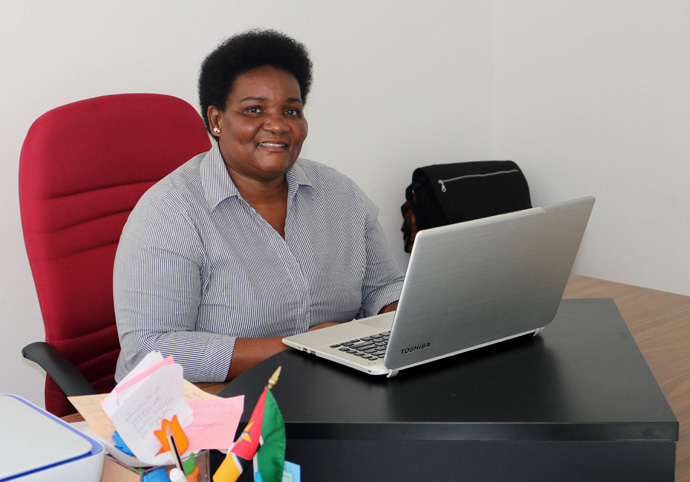
“Although we are in quarantine and observing the physical and social distance, our students receive materials and exercises prepared by teachers,” said the Rev. Olga Maria Raimundo, director of the United Methodist Community School in Tsalala, a suburb of Maputo.
There are seven United Methodist primary schools and four secondary schools in the country.
“Parents and guardians come to look for their children’s material, they photocopy it and help them study while at home,” Raimundo said.
Parents return the finished exercises and quizzes to school to be graded.
Raimundo said the school has 585 students assisted by 18 teachers and serves at least eight neighborhoods.
“During this pandemic period, we use platforms such as WhatsApp, text messages and, for those who can afford it, we even use Zoom. And, at times, our teachers answer phone calls to clarify some specific questions that arise as students read their materials,” she said.
“We understand that not all parents and guardians have access to WhatsApp and other forms of mass communications, because some of these have no network signal, neither internet. But, nothing deters us from assisting our students, thus ensuring continuous education of our children while in quarantine,” Raimundo said.
The secondary and primary schools are expected to open in late September and early October. United Methodist University of Mozambique reopened Aug. 18.
Jump to story: Kenya | South Africa | Zimbabwe | Sierra Leone |
Liberia | Mozambique | Congo
Older students in Congo return for final tests
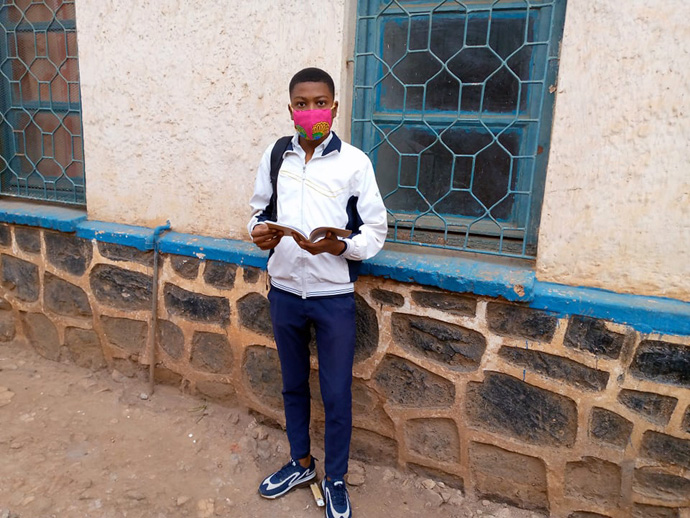
Sylvestre Muthoma was set to graduate from secondary school in Bukavu when classes were halted in March. He said he is thrilled to be able to finish the school year and move on to university.
During the confinement, United Methodist teachers hosted radio and television programs to continue teaching students in core subjects, said Dikete Yale, head of United Methodist schools in Kivu.
East Congo Bishop Gabriel Yemba Unda called on those in charge of United Methodists schools and universities to enforce coronavirus safety measures, including regular handwashing, social distancing and wearing masks.
“My intention is to have zero cases of COVID-19 after resuming classes in schools and universities,” he said.
Communicators Gad Maiga in Kenya, Nandipha Mkwalo in South Africa, Taurai Emmanuel Maforo and Kudzai Chingwe in Zimbabwe, Phileas Jusu in Sierra Leone, E Julu Swen in Liberia, Joao Filimone Sambo in Mozambique and Philippe Kituka Lolonga in Congo contributed to this report.
News media contact: Vicki Brown, news editor, newsdesk@umcom.org or 615-742-5469. To read more United Methodist news, subscribe to the free Daily or Weekly Digests.
Like what you're reading? Support the ministry of UM News! Your support ensures the latest denominational news, dynamic stories and informative articles will continue to connect our global community. Make a tax-deductible donation at ResourceUMC.org/GiveUMCom.


